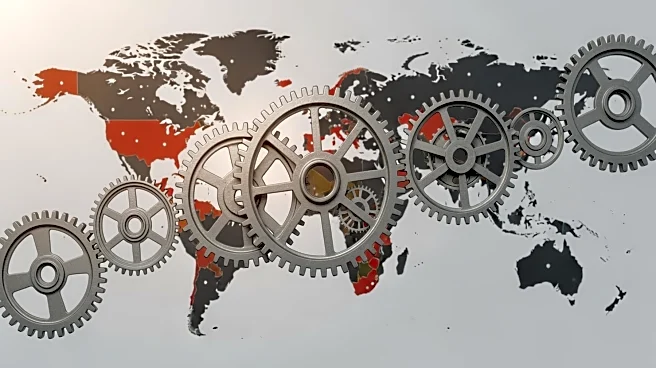What's Happening?
Asian manufacturing hubs are experiencing a downturn due to weak US demand and tariffs imposed by President Trump. Business surveys indicate that factory orders across the region have been negatively impacted,
with China's manufacturing activity slowing and South Korea's export orders declining. Despite some progress in trade negotiations during Trump's recent visit to Asia, exporters remain cautious about US demand. Private-sector purchasing managers' indexes (PMIs) for October show slower growth in China's manufacturing sector and a decline in South Korea, while Vietnam and Indonesia have seen growth in their manufacturing sectors.
Why It's Important?
The tariffs imposed by President Trump are affecting US trade relations with major Asian economies, potentially leading to broader economic consequences. The slowdown in manufacturing activity in China and South Korea could impact US imports, affecting American businesses reliant on Asian goods. The cautious optimism following the Trump-Xi tariff truce suggests that while immediate relief may be limited, deeper issues in US-Asia trade relations persist. This situation could influence US economic policy and trade strategies, impacting industries and consumers dependent on Asian imports.
What's Next?
The agreement between President Trump and Chinese President Xi Jinping to delay reciprocal tariffs may offer temporary relief, but the underlying trade tensions remain unresolved. Policymakers in Beijing are monitoring China's economic growth to determine if further stimulus is needed. The US may need to reassess its trade policies to address the ongoing challenges in its relations with Asian manufacturing economies. Future negotiations and trade deals will be crucial in shaping the economic landscape and determining the extent of tariff impacts on global trade.
Beyond the Headlines
The ongoing trade tensions highlight the complex dynamics between the US and Asian economies, with ethical and strategic considerations in play. The tariffs not only affect economic growth but also raise questions about the long-term sustainability of protectionist policies. The situation underscores the need for balanced trade agreements that consider both economic and diplomatic factors, potentially influencing future international trade norms and practices.









